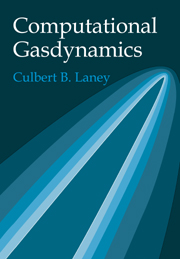Book contents
- Frontmatter
- Contents
- Preface
- Chapter 1 Introduction
- Part I Gasdynamics Review
- Part II Computational Review
- Part III Basic Principles of Computational Gasdynamics
- Chapter 11 Conservation and Other Basic Principles
- Chapter 12 The CFL Condition
- Chapter 13 Upwind and Adaptive Stencils
- Chapter 14 Artificial Viscosity
- Chapter 15 Linear Stability
- Chapter 16 Nonlinear Stability
- Part IV Basic Methods of Computational Gasdynamics
- Part V Advanced Methods of Computational Gasdynamics
- Index
Chapter 15 - Linear Stability
Published online by Cambridge University Press: 07 December 2009
- Frontmatter
- Contents
- Preface
- Chapter 1 Introduction
- Part I Gasdynamics Review
- Part II Computational Review
- Part III Basic Principles of Computational Gasdynamics
- Chapter 11 Conservation and Other Basic Principles
- Chapter 12 The CFL Condition
- Chapter 13 Upwind and Adaptive Stencils
- Chapter 14 Artificial Viscosity
- Chapter 15 Linear Stability
- Chapter 16 Nonlinear Stability
- Part IV Basic Methods of Computational Gasdynamics
- Part V Advanced Methods of Computational Gasdynamics
- Index
Summary
Introduction
This chapter concerns linear stability, while Chapter 16 will treat nonlinear stability. We begin with a general introduction to linear and nonlinear stability. Unfortunately, there are many different definitions for numerical stability, most of which differ from the definition of physical stability seen in Section 14.1. In particular, unlike physical instability, numerical instability does not necessarily imply sensitivity to small disturbances. Four common definitions of numerical stability are as follows:
Unbounded Growth A method is unstable if the error grows to infinity as time goes to infinity. In some definitions, the error is required to grow at a certain minimum rate (e.g., exponentially or algebraically). A method that is not unstable is stable.
Convergence A method is stable if it converges as Δx → 0 and Δt → 0, assuming only a few basic conditions such as consistency, conservation, and well-posed initial and boundary conditions. Otherwise, a method is unstable. In some definitions, the solution is required not only to converge but also to converge to the solution that satisfies the entropy condition. Somewhat surprisingly, the “unbounded growth” definition and the “convergence” definition are closely related, as discussed in Sections 15.4 and 16.11.
Physical A method is unstable if it exhibits significant errors created by interactions between various time and space approximations and, in particular, any errors that start small and grow with time. In other words, instability is any significant error beyond that found in the individual component approximations such as the forward-time approximation or the central-space approximation. Conversely, a method is stable when it exhibits only small errors beyond those caused by flaws in the individual component approximations.
- Type
- Chapter
- Information
- Computational Gasdynamics , pp. 255 - 271Publisher: Cambridge University PressPrint publication year: 1998
- 1
- Cited by



